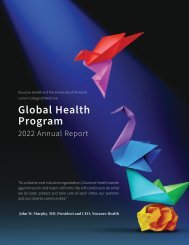eMagazine June 2023
Create successful ePaper yourself
Turn your PDF publications into a flip-book with our unique Google optimized e-Paper software.
OUR PEOPLE,<br />
OUR MISSION<br />
Global Health<br />
<strong>eMagazine</strong><br />
<strong>June</strong> <strong>2023</strong><br />
Perspective<br />
Global Health Academy<br />
Highlights<br />
Reflections<br />
Welcome<br />
Global Local<br />
Hispanic and Latinx Communities<br />
Voices of Ugandan Students<br />
Global Health Mental Health<br />
Art to Rwmind Us of Who We Can Be<br />
Our Beautiful Planet<br />
Innovation and Technology<br />
Nursing Division<br />
Women’s Health Education<br />
Among the Letters<br />
Announcements<br />
Article of the Month<br />
Video of the Month<br />
Congratulations<br />
Phoro News<br />
Calendar of Events<br />
Resources<br />
This gives less prominent hospitals an opportunity to increase their utilization and revenue. The<br />
growth in these mergers and acquisitions has significant impacts on the health care market<br />
and patient experience as well.<br />
What are Some of the Drawbacks? There is one main concern that health economists and<br />
experts have alluded to: higher costs and less access. In most industries, when a handful of<br />
groups or companies control a significant portion of the market, it typically leads to them being<br />
able to better determine prices due to the reduced competition. Many hospital executives<br />
believe this is not true for healthcare, including Dr. Kenneth Davis M.D., President and Chief<br />
Executive Officer of Mount Sinai Health System in New York City stating, “the fear that mergers<br />
curtail competition, leading to higher prices for medical care, reflects an old way of thinking.<br />
Thanks to cataclysmic changes in the delivery of health care, hospital mergers now offer the<br />
potential for higher quality and more efficiency.4” These arguments are not always applicable,<br />
as multiple studies conducted across the nation have found that the increase in market<br />
consolidation over the last decade have, in fact, led to somewhat higher costs for patients due<br />
to less competitive markets.5 Organizations are able to bring more weight into negotiations with<br />
insurance companies, leading to more expensive contracts and consequently higher premiums<br />
for members. This is a very nuanced subject, but in general, research shows that M&A deals do<br />
not always lead to patient benefits.<br />
But Don’t Larger Groups Lead to Higher Quality? Arguments in favor of increased mergers<br />
and acquisitions often cite greater quality of services and access to advanced treatments.<br />
This can certainly apply to smaller hospitals in difficult financial situations, however it does<br />
not necessarily apply to the wide majority of deals. A study published in the New England<br />
Journal of Medicine examined data on M&As from 2007 to 2016 while comparing a variety of<br />
quality measures to determine composite scores.6 It concluded that “hospital acquisition by<br />
another hospital or hospital system was associated with modestly worse patient experiences<br />
and no significant changes in readmission or mortality rates.” In general, M&A transactions do<br />
not lead to significant improvements in the quality of health care that patients receive, and in<br />
many cases may actually lead to lower quality. In addition to increased costs, these findings<br />
emphasize the dangers of this steadily growing trend.<br />
The Impact of COVID-19 & Looking Ahead: Prior to 2020, the number of hospital mergers was<br />
on an increasing trajectory. However, the COVID-19 pandemic has had a variety of implications<br />
that led to fewer M&A deals last year, from decreased utilization of services to massive drops in<br />
health care revenue.7 These factors have decreased incentives while increasing risks for health<br />
groups to pursue merger and acquisition deals.<br />
Although there was stunted growth on market consolidation during the pandemic, the trend<br />
continued afterward. This is apparent right here in Connecticut with the expansion of Yale<br />
New Haven Health into greater Waterbury. The number of independently owned hospitals has<br />
gone from 23 in 2000 to 6 this year.8 Although the effects are still unclear, there is a cause<br />
for concern especially in rural communities (as discussed in previous editions). If we seek to<br />
minimize these challenges and increase access to high quality services in this country, a series of<br />
important questions must be answered: Can the government restrict M&As in order to promote<br />
competition in the healthcare market? Should there be a limit to the size that hospital groups<br />
are able to grow? If public health insurance grows in the U.S. what effects will this have, if any,<br />
on the current trend of M&As?<br />
This trend will continue to have serious implications over the coming years, and is something<br />
that needs to be addressed if we seek to make healthcare more equitable and accessible for<br />
all.<br />
References:<br />
1. https://www2.deloitte.com/us/en/insights/industry/health-care/hospital-mergersacquisition-trends.html<br />
2. https://www.kaufmanhall.com/insights/research-report/2020-mergers-acquisitionsreview-covid-19-catalyst-transformation<br />
3. https://californiahealthline.org/news/sutter-health-class-action-lawsuit-hospitalconsolidation-medical-prices-health-care-costs/<br />
4. https://www.wsj.com/articles/kenneth-l-davis-hospital-mergers-can-lower-costs-andimprove-medical-care-1410823048<br />
5. https://academic.oup.com/qje/article/134/1/51/5090426?login=true<br />
6. https://www.nejm.org/doi/full/10.1056/NEJMsa1901383#article_citing_articles<br />
7. https://www.healthsystemtracker.org/chart-collection/how-have-healthcare-utilizationand-spending-changed-so-far-during-the-coronavirus-pandemic/#item-covidcostsuse_<br />
marchupdate_1<br />
8. https://ctmirror.org/2022/05/08/as-hospital-systems-grow-consolidate-rural-patientsct-lose-services-labor-delivery-intensive-care/<br />
Contact: ritesh.vidhun@tufts.edu<br />
17

















